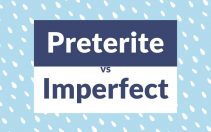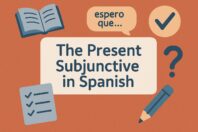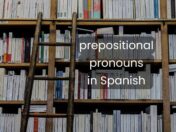Common Intermediate Spanish Mistakes: Part II

Get our free email course, Shortcut to Conversational.
Have conversations faster, understand people when they speak fast, and other tested tips to learn faster.
More infoIn this post, we will cover some of the most common Intermediate Spanish mistakes that are stopping you from sounding like a native speaker.
Whether you consider yourself to be a beginner, intermediate or even an advanced Spanish speaker, this post will help you eradicate some of the most common mistakes that students tend to make.
(In case you missed it, we already covered some intermediate Spanish mistakes here, and also beginner Spanish mistakes here.)
1. Expressing Possession with possessive adjectives and possessive pronoun
This one may sound simple, but you would be surprised how many beginner and intermediate students confuse expressing possession in Spanish.
And let’s be fair – there are several ways to express possession in Spanish, and perhaps that is the what confuses some students.
In this section, we will explore two different ways to express possession.
1) Spanish Possessive Adjectives:
First, remember that adjectives are words that accompany a noun – not replace it.
And so, a possessive adjective never replaces the noun, instead, it goes before the noun.
For example:
- My house – Mi casa
- Her daughter – Su hija
- Our car – Nuestro carro.
- Our School – Nuestra escuela.
PS. You should remember that the “our” form is the only possessive adjective that respects the gender (nuestro, nuestra, nuestros, nuestras).
Let’s recap all of the Spanish possessive adjectives in the below table:
| Personal pronoun | Possessive adjectives singular | Possessive adjective
plural |
English equivalent |
| Yo | Mi | Mis | My |
| Tú | Tu | Tus | Your |
| Él, Ella | Su | Sus | His/Her |
| Ustedes | Su | Sus | Your |
| Nosotros / Nosotras | Nuestro / Nuestra | Nuestros / Nuestras | Our |
| Ellos / Ellas | Su | Sus | Their |
- This is my pillow and this is your pillow – Esta es mi almohada y esta es tu almohada.
- Her brother is a professional dancer and her sister is a teacher – Su hermano es bailarín profesional y su hermana una maestra
- Our parents are from Paraguay – Nuestros padres son de Paraguay
2) Spanish Possessive Pronouns:
Spanish possessive pronouns are used to refer to the possessor, in order to tell us who owns the noun, or whom it has a relationship with.
Possessive pronouns always go after the noun, and every pronoun respects the gender and number of the noun.
Here is a quick formula to remember for using Spanish Possessive Pronouns.
(Demonstrative adjective / Article) + Noun + verb SER conjugated + Possessive pronoun
- The doll is mine – La muñeca es mía
- These books are ours – Estos libros son nuestros
- These shoes are theirs – Estos zapatos son suyos
And now, we can recap on all Spanish possessive pronouns.
| Personal pronoun | Possessive pronoun
singular |
Possessive pronoun
plural |
English equivalent |
| Yo | Mío / Mía | Míos / Mías | Mine |
| Tú | Tuyo / Tuya | Tuyos / Tuyas | Yours |
| Él, ella | Suyo / Suya | Suyos / Suyas | His/Hers |
| Ustedes | Suyo / Suya | Suyos/Suyas | Yours |
| Nosotros / Nosotras | Nuestro / Nuestra | Nuestros / Nuestras | Ours |
| Ellos, Ellas | Suyo / Suya | Suyos/Suyas | Theirs |
- The dress is mine, not yours – El vestido es mío, no tuyo
- This order is not ours. The waiter got confused – Este pedido no es nuestro. El mesero se confundió
- These dogs are theirs – Esos perros son suyos
Finally, there is one more way that Spanish speakers use possessive pronouns.
When talking about two things, and there is a type of choice between these two things, we use an article before the possessive pronoun.
Let’s see how this works in the below table.
| Personal Pronoun | Possessive pronoun
Singular |
Possessive pronoun
Plural |
English equivalent |
| Yo | El mío / La mía | Los míos / Las mías | Mine |
| Tú | El tuyo / La tuya | Los tuyos / Las tuyas | Yours |
| Él / Ella | El suyo / La suya | Los suyos / Las suyas | His/Hers |
| Usted | El suyo / La suya | Los suyos / Las suyas | Yours |
| Nosotros / Nosotras | El nuestro/ La nuestra | Los nuestros / Las nuestras | Ours |
| Ustedes | El suyo / La suya | Los suyos / Las suyas | Yours |
| Ellos / Ellas | El suyo / La suya | Los suyos / Las suyas | Theirs |
And now, a couple of examples:
- Your shoes are new, and mine are old. – Tus zapatos son nuevos, los míos son viejos
- This is not your lunch box, yours is over there – Esta no es tu lonchera, la tuya está por allá
- This is not her cat. Hers is black – Este no es su gato. El suyo es negro
(sidenote: when you use Spanish articles, they must also respect the gender and number of the noun)
2) Mixing Up The Spanish Perfect Tenses
Many students tend to confuse using the present perfect vs past perfect vs present perfect progressive.
Let’s begin with the first one.
We use the Spanish present perfect to express an action that began in the past, but continues in the present.
- I have worked a lot this morning. I will take a break – He trabajado mucho esta mañana. Tomaré un descanso
- We have had very good breakfast every day since we arrived at the hotel – Hemos tenido desayunos muy buenos todos los días desde que llegamos al hotel
We use the Spanish past perfect to talk about a past action that happened before a separate past action also happened.
- I had read the Harry Potter books before watching the movie – Yo había leído los libros de Harry Potter antes de ver la película
- They had warmed up before they started exercising – Ellos habían calentado antes de comenzar a hacer ejercicios
Finally, we use the present perfect progressive when talking about that something started in the past, and continues happening in the present.
- They have been dating for 1 year – Ellos han estado saliendo por 1 año
- She has been practicing for months – Ella ha estado practicando desde hace meses
Did you notice what these tenses all have in common?
They all require you to use the auxiliary verb HABER, along with a past participle of the action verb (which will be the same in past or present).
In fact, present perfect and past perfect follow the similar formula:
- Personal pronoun + Verb HABER conjugated + verb in participle + complement
The way haber is conjugated will depend on which perfect tense you are using.
Let’s see an example of this below:
| Personal Pronoun | Present perfect | English equivalent | Past perfect | English equivalent |
| Yo | He | I have | Había | I had |
| Tú | Has | You have | Habías | You had |
| Él / Ella | Ha | He / She has | Había | He / She had |
| Usted | Ha | You have | Había | You had |
| Nosotros / Nosotras | Hemos | We have | Habíamos | We had |
| Ustedes | Han | You have | Habían | You had |
| Ellos / Ellas | Han | They have | Habían | They had |
To form complete sentences, we simply add the past participle of the main active verb.
The best thing about this is that once we know the past participle – it doesn’t change. It will be the same, whether we’re talking in the present or past perfect tense.
Let’s review how to conjugate verbs in past participle, depending on the endings.
| Verbs Ending with -AR | Verbs Ending with -ER/IR | Verbs Ending with -IR |
| -ADO | -IDO | -IDO |
| Infinitive Verb | Participle | English equivalent |
| Trabajar | Trabajado | Worked |
| Caminar | Caminado | Walked |
| Leer | Leído | Read |
| Comer | Comido | Eaten |
| Ir | Ido | Gone |
| Vivir | Vivido | Lived |
Of course, there are some irregulars verbs that don’t follow the past participle endings above.
The most common ones are:
| Infinitive Verb | Participle | English equivalent |
| Decir | Dicho | Said |
| Hacer | Hecho | Done |
| Ver | Visto | Seen |
| Escribir | Escrito | Written |
| Poner | Puesto | Put |
| Volver | Vuelto | Returned |
Let’s see some examples:
- I’ve been vegan for 10 years – Yo he sido vegana por 10 años.
- I had been a dancer before – Yo había sido bailarina antes.
- I have had coffee very early. But I want a little more – Yo he tomado café muy temprano. Pero quiero un poco más.
- They have been very quiet – Ellos han estado muy tranquilos.
- We had seen the movie before her, and that’s why she got upset – Nosotros habíamos visto la película antes que ella, y por eso se molestó.
(Ps, we wrote a more in-depth post about the Spanish past participle here)
Until now, we covered the present perfect tense and past perfect tense.
For the present perfect progressive, the formula remains pretty similar. The only difference is that we must always use the verb estar in past participle and then add the progressive ending for the action verb.
- Personal pronoun + Verb HABER conjugated + verb ESTAR in past participle + -ing verb
Now, some examples:
- They have been studying a lot – Ellos han estado estudiando mucho
- I’ve been sleeping all day – Yo he estado durmiendo todo el día
- She has been cooking all day for the party. – Ella ha estado cocinando todo el día para la fiesta
(PS, if you’re not sure how to form -ing verbs in Spanish, then read here)
3) Using Imperfect Subjunctive and Conditional Together
It’s common for students to mix-up the imperfect subjunctive and the conditional, which sometimes results in incorrectly using both forms interchangeably.
Although a native speaker would probably understand what you’re trying to say, it’s still not grammatically correct.
Let’s take an example sentence: “If I loved you, you would know”
How would you say in Spanish this sentence?
- Si yo te amara, tu lo sabrías (conditional)
- Si yo te amara, tu lo supieras (imperfect subjunctive)
The correct form is number 1 using the conditional.
Before we clarify how to avoid confusing them, let’s recap on each form:
1) Conditional
When we form sentences in the Spanish conditional, we are usually talking about hypothetical situations, or asking for things in a very polite way
- I would have more money, but I spend everything on new clothes. – Yo tendría más dinero, pero me gasto todo en ropa nueva
- I would go to work out, but I am very tired. – Yo iría a hacer ejercicios, pero estoy muy cansada
- Could you help me with my homework? – ¿Podrías ayudarme con mi tarea?
The conditional form is also used to express something that we would do – depending on other conditions.
2) Imperfect Subjunctive
We use the imperfect subjunctive (just like the other subjunctives moods) to express courtesy, desires, emotions, doubts, expectations or things that have not happened yet.
- I wanted you to come to the party – Quería que vinieras hoy a la fiesta
- I would love to talk to you – Me encantaría que habláramos
So when do we use the Imperfect Subjunctive + the Conditional together?
Normally, we use the imperfect subjunctive to express a condition, under which the conditional action would have an effect.
You may have heard this described as IF clauses, which are sentences that express: “what would happen IF…”
The formula is fairly straightforward.
- If + Imperfect subjunctive + complement + conditional+complement
So why do students get confused about when using imperfect subjunctive and the conditional?
Normally, it’s due to the conjugation, as both are a little similar.
Below are the endings for regular verbs conjugated in the conditional and imperfect subjunctive.
| Personal pronoun | Conditional
ending for verbs -AR, -ER, -IR |
Imperfect Subjunctive ending – AR | Imperfect Subjunctive ending -ER, -IR |
| Yo | -ía | -ara | -iera |
| Tú | -ías | -aras | -ieras |
| Él / Ella | -ía | -ara | -iera |
| Usted | -ía | -ara | -iera |
| Nosotros / Nosotras | -íamos | -aramos | -ieramos |
| Ustedes | -ían | -aran | -ieran |
| Ellos / Ellas | -ían | -aran | -ieran |
Now, let’s see actual how each form is conjugated:
Conditional Conjugation
| Personal pronoun | Trabajar
(To work) |
Hablar
(To talk) |
Ser
(To be) |
Decir
(To say) |
| Yo | Trabajaría | Hablaría | Sería | Diría |
| Tú | Trabajarías | Hablarías | Serías | Dirías |
| Él / Ella | Trabajaría | Hablaría | Sería | Diría |
| Usted | Trabajaría | Hablaría | Sería | Diría |
| Nosotros / Nosotras | Trabajaríamos | Hablaríamos | Seríamos | Diríamos |
| Ustedes | Trabajarían | Hablarían | Serían | Dirían |
| Ellos / Ellas | Trabajarían | Hablarían | Serían | Dirían |
Imperfect Subjunctive Conjugation
| Personal pronoun | Trabajar
(To work) |
Hablar
(To talk) |
Ser
(To be) |
Decir
(To say) |
| Yo | Trabajara | Hablara | Fuera | Dijera |
| Tú | Trabajaras | Hablaras | Fueras | Dijeras |
| Él / Ella | Trabajara | Hablara | Fuera | Dijera |
| Usted | Trabajara | Hablara | Fuera | Dijera |
| Nosotros / Nosotras | Trabajáramos | Habláramos | Fuéramos | Dijéramos |
| Ustedes | Trabajaran | Hablaran | Fueran | Dijeran |
| Ellos / Ellas | Trabajaran | Hablaran | Fueran | Dijeran |
Once you nail down the conjugation, remembering the order of conditional and imperfect subjunctive is easy.
The imperfect subjunctive will always go after if (si).
It doesn’t matter if you start the sentence with if (si), or start with the conditional.
- If I were president, I would make the best protection law for animals and nature – Si yo fuera presidente, haría la mejor ley de protección para los animales y la naturaleza
And now an example of the opposite order:
- I would make the bestprotection law for animals and nature, if I were president – Yo haría la mejor ley de protección para los animales y la naturaleza, si yo fuera presidente
Finally, here’s a couple of more examples:
- What would you buy if you had a lot of money? I would buy a plane – ¿Qué comprarías si tuvieras mucho dinero? Yo compraría un avión
- If you could have a super power, which one would you have? – Si pudieras tener un super poder, ¿Cuál tendrías?
- If I said everything I think, people would be upset. – Si dijera todo lo que pienso, las personas se molestarían
4) Asking with ¿Alguna vez has…?
When we want to ask someone if they have ever done something, we use the present perfect tense to express “ever“, which in Spanish is “alguna vez has…?”
For example:
- Have you ever eat ants? No, I’ve never eaten any kind of insects – ¿Alguna vez has comido hormigas? No, yo nunca he comido ningún tipo de insectos
- Have you ever been to Colombia? Yes, I’ve been there – ¿Alguna vez has estado en Colombia? Si, yo he estado ahí
If you are answering this question, you will choose an affirmative or a negative answer.
For negative answers, the answer will be in the present perfect tense, along with “no, nunca” (no, never).
Let’s see how this works.
- Have you ever tried spicy chocolate? No, I’ve never tried spicy chocolate. – ¿Alguna vez has probado el chocolate picante? No, nunca he probado el chocolate picante.
- Have you ever jumped from a trampoline? No, I’ve never jumped, but I want to. – ¿Alguna vez has saltado desde un trampolín? No, nunca he saltado, pero quiero hacerlo.
If your answer is affirmative, you can use the present perfect or the simple past tense.
- Have you ever been to the beach alone? Yes, I have gone to the beach alone – ¿Alguna vez has ido sola a la playa? Si, yo he ido sola a la playa.
- Have you ever been to a Marilyn Manson concert? – Yes, I went to a concert 10 years ago – ¿Alguna vez has ido a un concierto de Marilyn Manson? – Si, yo fuí a un concierto hace 10 años.
5) Making Comparisons In Spanish
We already know that comparisons help us to differentiate and describe people and things, comparing them with others.
Just as you would do in English, there are three ways to make comparisons in Spanish.
Let’s take a look.
1) Comparative of Inequality
Here, as the name implies, we compare the differences between people or things.
Below is the formula we use to compare inequalities.
- Más (more) + Adjective/adverb + que + complement
- Menos (Less) + adjective/adverb + que+complement
Let’s see some examples:
- My sister is shorter than me – Mi hermana es más baja que yo
- My cat is fatter than yours – Mi gato es más gordo que el tuyo
- Buses are less fast than trains – Los buses son menos rápido que los trenes
- Adults are less happy than children – Los adultos son menos felices que los niños
In Spanish when we want to say that something is better or worse, we use these exceptions “mejor” and “peor”
| Adjective | English equivalent | Comparative | English equivalent |
| Bueno | Good | Mejor | Better |
| Malo | Bad | Peor | Worse |
- Going to the beach is better than going to a party – Ir a la playa es mejor que ir a una fiesta
- Having a stomachache is worse than having a headache – Tener dolor de barriga es peor que tener dolor de cabeza
2) Equality comparatives
With this formula, we can describe identical characteristics that are possessed by two people, things or animals.
There is nothing more or less, it is exactly the same.
- Tan + adjective + como + complement – (As + adjective + as + complement )
Some examples:
- You cooked as good as grandma – Tu cocinaste tan bien como la abuela
- Dogs are as funny as cats – Los perros son tan divertidos como los gatos
- My cake is as delicious as yours – Mi torta es tan deliciosa como la tuya
- This class is as boring as the previous one – Esta clase es tan aburrida como la anterior
- Sodas are as bad as junk food – Los refrescos son tan malos como la comida chatarra
3) Superlatives
Just as we do in English, we use superlatives in Spanish to describe the quality of what we are talking about as absolute. There is no more or less.
We want to show you the most common way to use superlatives, and the good news is that these are very similar to English.
- El más / La más + adjective + complement (The most + adjective + complement)
- El menos / La menos + adjective complement (The least + adjective + complement)
It’s important to remember that superlatives in Spanish respect gender and number.
Let see some examples of superlatives in action:
- This is the hottest summer, in the last 10 years – Este es el verano más caliente en los últimos 10 años
- Sloths are the least fastest of all animals – Las perezas son las menos veloces de todos los animales
- She is the most beautiful of the beauty contest – Ella es la más bonita del concurso de belleza
Just as we mentioned for comparatives of inequalities, there are some exceptions which aren’t typically used with “más/menos”.
| Adjective | English equivalent | Superlative | English equivalent |
| Bueno | Good | El Mejor / La mejor | The best |
| Malo | Bad | El Peor / La peor | The worst |
| Grande | Big | El mayor / La mayor | The eldest |
| Pequeño | Small | El menor / La menor | The youngest |
- Juan is the eldest of his brothers – Juan es el mayor de sus hermanos
- My mom is the youngest in the family – Mi mamá es la menor de la familia
- They are the best of the team – Ellos son los mejores del equipo
- That restaurant has the worst service – Ese restaurante tiene el peor servicio
Common Intermediate Spanish Mistakes: Exercises
How much did you learn from this post?
Test yourself by completing the below fill in the blank exercises. You can find the answers below.
1. Este es ____ carro, pero la casa es _____.
(This is my car but the house is hers)
2. ____ universidad es muy famosa, pero la _____ es mejor.
(His university is very famous, but ours is better)
3. ___ _____ en esta empresa por 10 años.
(I have worked in this company for 10 years)
4. Yo _____ _____ la cena, pero él me invitó a un restaurante.
(I had made dinner, but he invited me to a restaurant)
5. Ellos _____ _____ bailando toda la noche
(They have been dancing all night)
6. Si _____ de darme tanto trabajo, _____ salir temprano de la oficina.
(If you stopped giving me so much work, I could leave the office early)
7. Nosotros ______ la torta, si no _____ nueces.
(We would taste the cake, if it didn’t have nuts)
8. ¿Alguna vez _____ _____ una carrera de autos?
(Have you ever seen a car race?)
9. ¿_____ vez han _____ salsa?
(Have you ever danced salsa?)
10. Este vestido es _____ corto como el otro.
(This dress is as short as the other)
11. Fue ____ _____ comida que he probado en semanas.
(It was the best food I’ve had in weeks)
12. Tu hermano es ____ alto ____ tú.
(Your brother is taller than you.)
Common Intermediate Spanish Mistakes: Answers
- Este es mi carro, pero la casa es suya
- Su universidad es muy famosa, pero la nuestra es mejor
- He trabajado en esta empresa por 10 años
- Yo había hecho la cena, pero él me invitó a un restaurante
- Ellos han estado bailando toda la noche
- Si dejaras de darme tanto trabajo, podría salir temprano de la oficina
- Nosotros probaríamos la torta, si no tuviera nueces
- ¿Alguna vez has visto una carrera de autos?
- ¿Alguna vez han bailado salsa?
- Este vestido es tan corto como el otro
- Fue la mejor comida que he probado en semanas
- Tu hermano es más alto que tú



